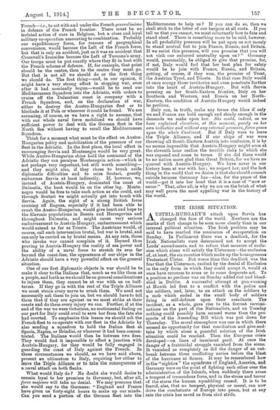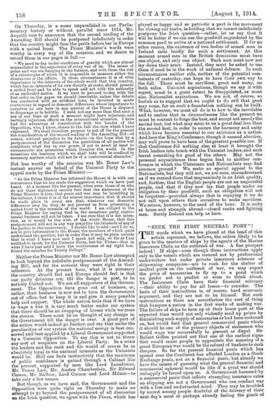THE IRISH SITUATION.
AUSTRIA-HUNGARY'S attack upon Servia, has changed the face of the world. Nowhere are the marks of that change to be seen more clearly than in our internal political situation. The Irish problem may be said to have reached the maximum of exasperation on Sunday. In Parliament there was a deadlock, for the Irish Nationalists were determined not to accept the Lords' amendments, and to refuse that measure of exclu- sion which alone will satisfy the Ulstermen—the exclusion of, at least, the six counties which make up the homogeneous Protestant Ulster. But worse than this deadlock was the fear that the Ulstermen, excited by the denial of Exclusion in the only form in which they could accept it, would at once have recourse to arms or to some desperate act. To a position so perilous was on Sunday added riot and blood- shed in Dublin. A successful attempt at gun-running at Howth led first to a conflict with the police and the soldiers, and, later, to an attack on the soldiers by a mob which ended in the small body of soldiers firing in self-defence upon their assailants. The incident, as a whole, gave rise to the fiercest recrimi- nations on the part of the Nationalists, and on Tuesday nothing could possibly have seemed worse than the pro- spects of the Amending Bill which was put down for Thursday. The moral atmosphere was one in which there seemed no opportunity for that conciliation and give-and- take by which alone a peaceful solution of the Irish situation could be reached. Then the European crisis developed—on lines of imminent peril. At once the danger of a fratricidal struggle vanished from the scene. It vanished as completely as did the danger of an out- break between three conflicting navies before the blast of the hurricane at Samoa. It may be remembered how in the "eighties " the squadrons of England, America, and Germany were on the point of fighting each other over the administration of the Islands, when suddenly there arose a tempest of tremendous force, and in the stress and terror of the storm the human squabbling ceased. It is to be feared, alas, that no tempest, physical or moral, can now drive the combatants of Europe into peace, but at any rate the crisis has saved us from civil strife. On Thursday, in a scene unparalleled in our Parlia- mentary history or without parallel since 1814, Mr. Asquith rose to announce that the second reading of the Amending Bill should be postponed indefinitely in order that the country might face the perils before her in Europe with a united front. The Prime Minister's words were worthy in every way of the occasion, and we desire to record them in our pages in full :— " We meet to-day under conditions of gravity which are almost unparalleled in the experience of every one of us. The issues of peace and war are hanging in the balance, and with them the risk of a catastrophe of which it is impossible to measure either the dimensions or the effects. In these circumstances it is of vital importance in the interests of the whole world that this country, which has no interests of its own directly at stake, should present a united front and be able to speak and act with the authority of an undivided nation. If we were to proceed to-day with the first order on the paper we should inevitably, unless the debate was conducted with an artificial tone, be involved in acute controversy in regard to domestic differences whose importance to ourselves no one here in any quarter of the House is disposed to disparage or to belittle. I need not say more than that such a use of our time at such a moment might have injurious, and lastingly injurious, effects on the international situation. I have had the advantage of consultation with the Leader of the Opposition, who, I know, shares to the full the view which I have expressed. We shall therefore proposo to put off for the present the consideration of the second reading of the Amending Bill—of course, without prejudice to its future—in the hope that by a postponement of the discussion the patriotism of all parties will contribute what lies in our power, if not to avert at least to circumscribe the calamities which threaten the world. In the meantime the business which we shall take will be confined to necessary matters which will not be of a controversial character."
Not less worthy of the occasion was Mr. Bonar Law's instant answer on behalf of the Unionist Party to the appeal made by the Prime Minister :— "As the Prime Minister has informed the House, it is with our concurrence that he has made the suggestion which we have just beard. At a moment like the present, when even those of us who do not share diplomatic secrets feel that the statement of the Prime Minister is true, that peace and war may be trembling in the balance, I think it is of the utmost importance that it should be made plain to every one that, whatever our domestic differences may be, they do not prevent us from presenting a united front in the councils of the world. I am obliged to the Prime Minister for saying that in the meantime party contro- versial business will not be taken. I am sure that it is his inten- tion, as it would be the wish of the whole House, that this postponement will not in any way prejudice the interests of any of the parties to the controversy. I should like to add—and I do so, not to give information to the House, the members of which quite understand the position, but in order that it may be plain outside that in what I have now said I speak not only, so far as I am entitled to speak, for the Unionist Party, but for Ulster—that in what I have just said I have the concurrence of my right hon. friend the member for Trinity College."
Neither the Prime Minister nor Mr. Bonar Law attempted to look beyond the indefinite postponement of the Amend- ing Bill, and for the moment they were right in their reticence. At the present hour, what it is necessary the country should feel and Europe should feel is that our party divisions are, till the danger is past, to be entirely blotted out. We are all supporters of the Govern- ment. The Opposition have gone out of business, or, rather, their business is now not to turn the Government out of office, but to keep it in and give it every possible help and support. The whole nation feels that if we have to wage a war it is very much better under our system that there should be no swapping of horses while we cross the stream. There must be no thought of any change in the Government till the danger is over. A great part of the nation would indeed go further, and say that under the peculiarities of our system the national energy is best con- served and best applied by a Liberal Government supported by a Unionist Opposition. To say this is not to throw any sort of suspicion on the Liberal Party. In a crisis the leaders and the rank and file would of course be as absolutely loyal to the national interests as the Unionists would be. Still one feels instinctively that the maximum of public confidence is gained through a Cabinet like the present, supported by men like Lord Lansdowne, Mr. Bonar Law, Mr. Austen Chamberlain, Sir Edward Carson, Mr. Balfour, Lord Curzon and Lord Milner—to take only a few names.
But though, as we have said, the Government and the Opposition were quite right on Thursday to make no attempt to go beyond the postponement of all discussion on the Irish question, we agree with the Times, which has played so happy and so patriotic a part in the movement for closing our ranks, in holding that we cannot indefinitely postpone the Irish question—rather, let us say that it will be better if we can use the goodwill engendered by the common peril to arrive at a national settlement. If for no other reason, the existence of two bodies of armed men in Ireland calls loudly for such a settlement. At this moment armed men in the British dominions must have one object, and only one object. Such men must now not lay down their arms. Instead, they must be asked to use them if need be in the work of national defence. In such circumstances neither side, neither of the potential com- batants of yesterday, can hope to have their own way to the full. There must be sacrifices, great and many, on both sides. Unionist aspirations, though we say it with regret, must to a great extent be disappointed, as must also Nationalist aspirations. We are not, of course, so foolish as to suggest that we ought to do evil that good may come, for on such a foundation nothing can be built. What, however, we must all do is to bow to the inevitable and to realize that in circumstances like the present we must be content to forgo the best, and accept not merely the second best, but what may seem to us a great deal less than the second best, in order to secure the harmony and unity which have become essential to our existence as a nation. And here the King's Conference, though it seemed abortive, may well prove to have been of the greatest possible use. If that Conference did nothing else, at least it brought the Irish leaders into touch with the Unionist leaders, and each learnt something for good of the others. May not the personal acquaintance thus begun lead to another con- ference in which the Ulstermen and Nationalists may find common ground ? We make no special appeal to the Nationalists, but they will not, we are sure, misunderstand us if we remind them that magnanimity is an Irish quality, and, further, that the English people are not an ungrateful people, and that if they now lay that people under an obligation by their goodwill, such an obligation will not be forgotten—provided always that in repaying it we do not call upon others than ourselves to make sacrifices. We return, however, to the need of the hour. It is unity at home and strength abroad—closed ranks and fighting men. Surely Ireland can help us here.



































 Previous page
Previous page